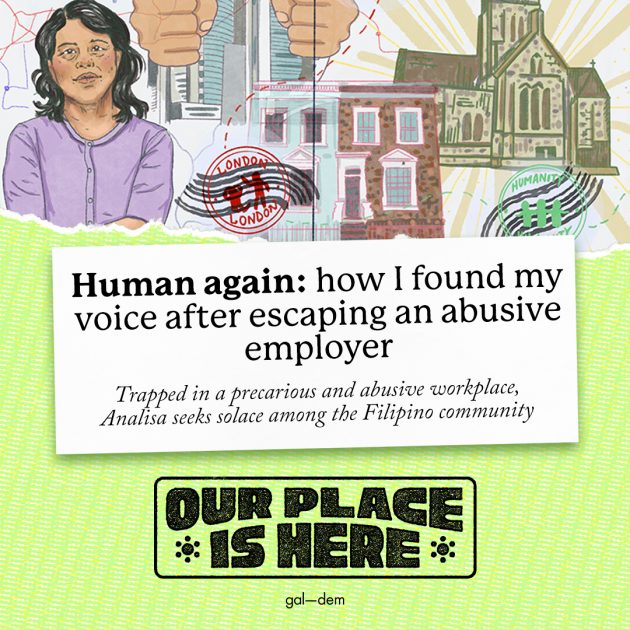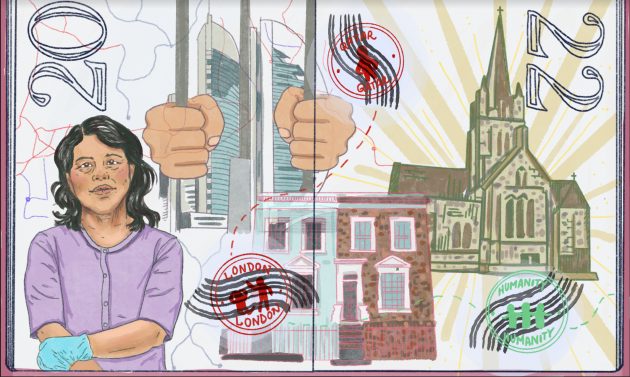Human Again: How I found my voice after escaping an abusive employer by Analisa


Human Again: How I found my voice after escaping an abusive employer by Analisa
*This article was originally published on gal-dem in September 2022*
This essay is part of a collection of personal essays from gal-dem, written and spoken by migrant domestic workers living in the UK. These are their stories, in English and Filipino, written in their words.
Poverty pushed me to leave my family and work abroad.
“Are you sure about this?” my husband, Leo, asked gently. “I should be the one who should leave, not you.”
“It’s just going to be for two years, and I will go home once we have paid all our debts,” I replied.
Leo took me to the bus stop. “You can go home now. I will be boarding the bus in a little while.” I bid him goodbye. “Please take good care of our kids. If they ask for me, you know what to tell them.”
My tears started to fall as I let go of his hands. He turned his back on me, slumped and sad.
Before my flight, I asked myself if I did the right thing – I had heard news about people like me getting abused, raped and some even ended up dead because of their employers – but I still chose to take the risk.
It was 11pm when I got to my employer’s house in Qatar. “Put down your stuff and pick up all that trash scattered on the floor!” shouted a big woman. I fearfully followed her instructions.
“I wore layers and layers of clothes to shield me from the cold”
Another lady, who was quietly ironing clothes, approached me and led me to a small room. I felt tired, sad and frightened. I was afraid of my employer because, instead of letting me rest first, she loudly ordered me around. I had no bed so I lay down on the floor, with a towel that I brought from the Philippines to cushion my back from the cold cement. I had no blankets nor pillows, so I wore layers and layers of clothes to shield me from the cold. I thought of my kids going to school, I knew they would look for me. I was sure my youngest daughter, who could not sleep without me beside her, would be crying. I also thought of where I was at that time, and how heavy I felt about my circumstance – why did they have to make me sleep on the floor? I fell asleep, weeping.
Blag! I was awakened by a loud kick from the door outside.
“Hurry up, wake up the three boys! They need to eat,” shouted my employer. I was not expecting this kind of work. From the contract I signed, I had been told that I would be working for a family with only one child, but the household had eight kids.“I did not want to go with them because I knew my life would be a living hell”
“I did not want to go with them because I knew my life would be a living hell”
I asked for help from my agency multiple times, but they never provided any. I also begged my employers to let me go home but they demanded that I pay them 10,000 Qatar riyals, the amount they said they shelled out to bring me in from the Philippines. They said they would call the police if I didn’t pay. I had no choice but to endure the inhumane treatment of my employers, along with the very heavy workload.
We moved to London after a year, in 2017. I did not want to go with them because I knew my life would be a living hell – I was the only domestic worker that they planned to take with them – and that was exactly what happened.
“Lazy, stupid, an animal,” my employer shouted angrily, slapping and kicking me several times. She was upset that I couldn’t clean the house when my priority was taking care of the two-year-old twins and her four-year-old girl.
“This is too much,” I cried. I could endure verbal and emotional abuse, but not physical abuse. “The moment I get the chance, I will leave this place,” I whispered to myself.
I called the Philippine Embassy in London, seeking help, but the only thing they could do was repatriate me. I was not yet ready to go home: I still had our debts to pay, and no work there could sufficiently support my family. And so, I decided to endure the hell that I was in – at least I could still send money back home.
“They held my passport. That’s how they controlled me”
One day, I was able to talk to a couple who lived nearby. They said that they pitied me because they noticed how I was being badly treated. Oftentimes, I had nothing to eat, leaving me with no choice but to steal food from my employers to satisfy my hunger. I did not have money to buy food because my entire salary was sent back home. I was also not allowed to leave the house unless I was accompanied by my employers or the kids, and they held my passport. That’s how they controlled me.
“To be honest, I really want to escape,” I told the couple. “But I do not know where to go, I do not know anyone here in London.”
“Oh, really! You are welcome to come to our house if you decide to leave them,” my neighbour assured me. And so, I had a shimmer of hope, at last.
But then we moved to a different flat, and my communication with the couple who wanted to take me in was cut off.
One morning, while my employers were sleeping, I left the house with nothing but two black bin bags containing my clothes. My knees were shaking as I walked away. I got in a taxi and asked to be taken to the only place I knew – Tesco’s. I contacted my former neighbours and they got me there. Nevertheless, after two months of living with them, I started to see the couple’s true colours. They asked me to work 12-hour days for six days a week, and they only paid me £330 each month. Often, the wife would get mad at me for reasons I could not understand.
Again, I googled for help, searching for different Filipino community organisations in London. I came across the website for St. John’s Church in Notting Hill that instantly stood out to me when I saw that the church held mass in Tagalog every Sunday afternoon. With that in mind, I decided to visit one afternoon, with the hopes of finding someone I could talk to and confide in about the situation I found myself trapped in.
At the church, the priest assured me while tapping my shoulder. “Do not be afraid, you are safe now, you are in good hands now. The Filipino Domestic Workers Association (FDWA) is here; they help abused domestic workers like you.”
Three women and a man approached me.
“Don’t be afraid, don’t cry, we are here to help you. No one can abuse you again,” the man said.
“We will refer you to Kalayaan, a charity that helps migrant domestic workers, who will support you,” said a woman as the two of them almost shed tears as I recounted my experience.
I didn’t even know what they called ‘Kalayaan’, but I felt like I had just been released from prison. I began to feel secure and the fears in my mind started to disappear.
While I was still at the church, I heard my phone ring. “Hello, why aren’t you home yet, it’s 7pm already,” hissed the wife on the call. “Don’t you dare come back here after what you’ve done.”
I got worried. “Where could I go?” I asked.
“Don’t fret, if you have nowhere to stay for the night, you can stay with us,” said one of the women, called Sheila.
I stayed at Sheila’s house, where there were three other women who also escaped their employers. Sheila is a member of FDWA. There were people who came to the house who gave me water, food, personal stuff and clothes. Each of them hugged me and I felt so safe again. I finally felt like I was being treated as a human again after two years of inhumanity.
